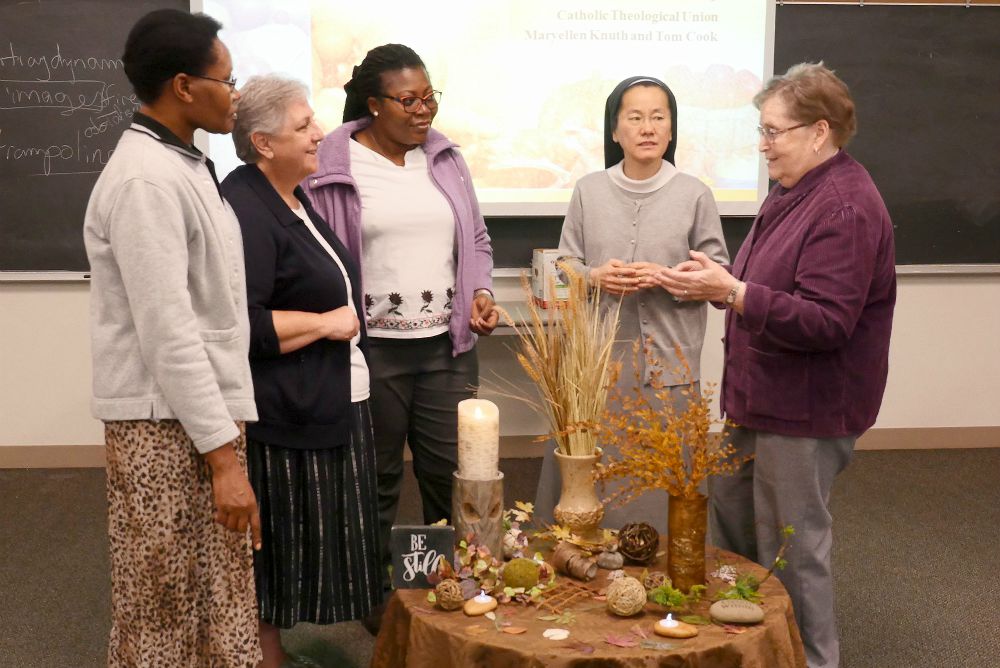
Dominican Sr. Lucianne Siers, right, talks with women religious from around the world who came to Catholic Theological Union in Chicago to study formation in Siers' program, the Institute for Religious Formation. (Courtesy of Kellene Urbaniak)
Dominican Sr. Lucianne Siers is director of the Institute of Religious Formation at the Catholic Theological Union, based in Chicago. Previously, she served as executive director of the Partnership for Global Justice, a New York City-based nongovernmental organization to the United Nations. She has earned several degrees from institutes of higher learning, including a Doctor of Ministry degree in missiology and catechesis from the Catholic University of America in Washington, D.C., and a Certificate in Spiritual Direction from Fordham University.
For 10 years, Siers taught junior high school, which she says gave her experience in helping develop the personalities of individuals. She is also a stone sculptor.
"Art is part of my life, and I know how freeing that is," she says. "Once a person has developed a skill, they always have it. No matter where they are, they can figure out how to free themselves up."
Through her current work with the Institute of Religious Formation, Siers is leading what many consider to be a radical shift in religious life: Her work with formating sisters emphasizes developing one's individual personality alongside the self-surrender that comes with the choice to enter religious community life.
Advertisement
GSR: You direct the Institute of Religious Formation at Catholic Theological Union, facilitating a program to train men and women who lead formation programs in their communities. Can you share some more details about the program you developed?
Siers: It is a nine-month program invoking the question, "How do we do formation?" Formation is the whole idea of bringing forth anybody who comes to us who would like to be a member of a congregation, a person that's basically discerning. Does this person really want to be a religious, or is this just a phase?
Right now, we have four women who are being trained to learn how to develop their skills to form young women who are considering entering their communities. They came here from Australia, Ghana, South Korea and Kenya. Last year, we welcomed women from China, Vietnam and Bangladesh, as well.
What we do, along with the seven men in our program, is model what a formation program can be. So we develop prayer styles and reflection groups. We have classes Monday through Friday in theology and Scripture and psychology and spirituality and religious life. There is also a component that is a whole understanding of developing a community interculturally and how to do that.
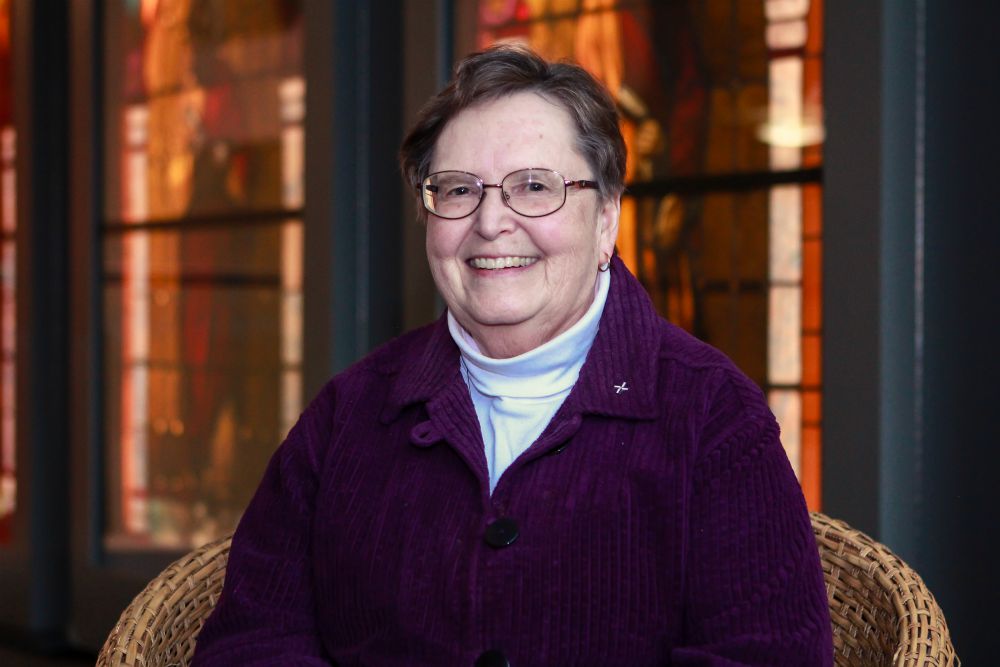
Dominican Sr. Lucianne Siers (Catholic Theological Union/Ronald Brown)
Part of your current ministry is promoting intercultural exchanges and the flourishing of diversity. Can you speak more about that?
Here at CTU, we have an emphasis on interculturality with intercultural living and theology. How do we weave in the dimensions of many cultures as opposed to one monoculture? The definition of "interculturality" we are emphasizing is different than the "melting pot" concept. It's more like images of a salad or a burst of fireworks that have just many, many different colors.
Instead of making us all look the same, talk the same, and walk the same, we are really working to develop the individuality and the gifts that God made that person to be and to really call that forth.
In your program, in addition to promoting diversity, you also make efforts to encourage individuality. Why is that important, and how do you do that?
What we're trying to do is just a holistic program to develop in religious life the fullest possibilities of each person. That's what we're doing in this program. They form community. We have discussions, and we play together. We do a lot of reflection and challenge one another so that our participants can build the skills they need so when they go home, they have some reference points, and they know they can do it.
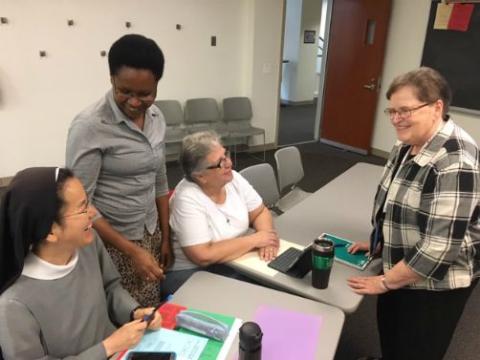
Dominican Sr. Lucianne Siers, right, with some of the participants in the formation program (Provided photo)
Our program emphasizes a very different way than the way formation has been done historically. We encourage the formator to ask each candidate what gifts they bring to the congregation. How can the formator and the congregation they're looking at assist them in developing those gifts?
It's not: Everybody looks the same and thinks the same, and we just pour into them the history of the congregation and expect them to regurgitate it. What I want to emphasize is shifting that whole perspective and saying, "What gifts do you bring to this congregation? Coming from where you are, how do you share that?"
What are some of the ways you have found to effectively teach this lesson of developing one's individuality either as a formator or a candidate?
My intention of developing this program for the formators is to do that for them so they know that they're being called forth. When we had our group meetings, I said, "I will never tell you what to do. You're adults." They took that seriously. They are able to decide for themselves how to spend their free time. We had different people take them to downtown Chicago so they know how to ride the bus, as one example. We work to provide ways they can experience what they need, what they want.
We are also looking for them to develop their leadership skills. We give them the power to create the kind of community they really need. They met together and developed how they're going to do kitchen cleaning, for example. They also worked out for themselves time for prayer and how they're going to do it. For a lot of communities, this is pretty radical thinking. We're asking them to share their gifts with us. When I introduced that concept, their eyes lit up. Really, we can be free? And there were smiles on their faces.
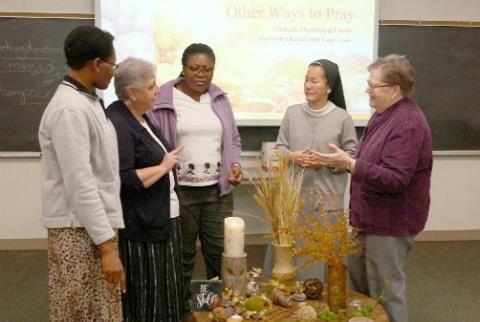
"We are really doing deep reflection and addressing diverse forms of prayer." —Dominican Sr. Lucianne Siers, at right (Courtesy of Kellene Urbaniak)
Some of them came from really rigid, confined communities where everybody had to do things regimentally. And we didn't do that here. They could make their own choices for what they wanted to do. We provided as much as we could in terms of opportunities for that. Not just in intellectual studies. We did some hands-on art, and I hope to add this year some creative writing. We work on giving them the opportunity to develop some skills that are creative, and we really encourage that.
For some of them, the only form of prayer they knew was going to Mass and praying the rosary. For them to have spontaneous prayer and opportunities for hearing religious music as part of our prayer — and drawing and looking at art is part of our prayer — all of the possibilities of using not just our head, but our heart and our hands and our bodies to develop who we are as full human beings.
How do you teach around that tension of being a spiritual individual? Obviously, a big part of that choice to devote your life to spirituality — in whatever form — is to surrender your individual self and your ego to God. But still we are all here, having the human experience.
One obvious necessity is the understanding of being a full adult sexual person and understanding that we all have sexuality. We don't suppress it by taking a vow of celibacy. This is not just true in America; it's becoming more and more obvious that other countries also have the problem of sexual abuse, particularly of women.
Part of our program is helping women to understand their bodies and find ways to be ministered to after they've been violated while also making sure all of us have the ability to understand our full sexuality in a mature and holy way. We just can't dive into something when we're 12 or 15 years old, because we develop and continue to develop throughout our lives. We have a number of classes on human sexuality and lots of open discussion with both male and female psychologists. That's a very strong part of our program.
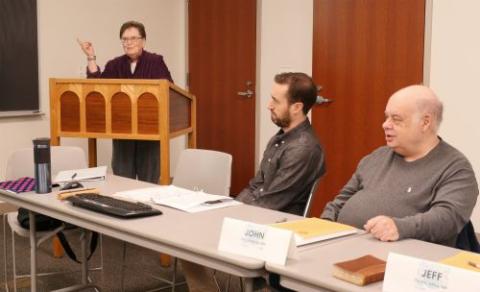
Dominican Sr. Lucianne Siers teaches a class for the Institute of Religious Formation, the program she directs at Catholic Theological Union in Chicago. (Courtesy of Kellene Urbaniak)
We are also conscious in terms of thinking of the whole person. We're not just pouring in knowledge. We are really doing deep reflection and addressing diverse forms of prayer. It's important to have other ways we can be human, like photography and art and dancing. All of the arts really do offer that opportunity. In many ways, our program is a full curriculum in human development.
With regard to emphasizing interculturality and diversity while also acknowledging that the program is based in America, to what degree are you teaching from an American perspective?
We offer some opportunities for study in case they don't have the opportunities in their countries. In some parts of the world, the theological and psychological and spiritual opportunities are almost zero. How do we offer those and assist in developing sound, stable congregations that can serve the people in the regions without making them look like United States congregations? That's the challenge. I don't want them to think that we have all of the answers to everything, because we don't. We don't want everyone to think like we do in the United States. We want to encourage their development of culture. We do that in all our classes.
Just in case, we offer opportunities in renewing theology. Not all the congregations overseas have good theological opportunities. Some of the congregations for 30 or 40 years have not developed a good Vatican II theology. So we have classes in theology and Scripture and all the latest insights and research.
How might you suggest congregations put into practice some of these values around interculturality, if they're interested?
Everybody will do it differently. The question is: How do we start relationships that can be fruitful beyond our borders? It's developing friendships. That's where we need to start. Everybody will do it differently.
Let's open our attitudes so we can at least relate to our neighbors, especially those who are broken and suffering. And not just send them money. How can we start integrating some of that thinking in really creative ways? Just put it out there and see what creative ways are happening. Let's use technology. Let's get our older sisters to write letters and have pen pals. We can also pray for sisters in other countries. Or we can get to know one congregation in another country, then once you get to know it, you can travel overseas to visit. It opens up a whole new world we never thought about before.
[Georgia Perry is a journalist originally from Indianapolis.]







